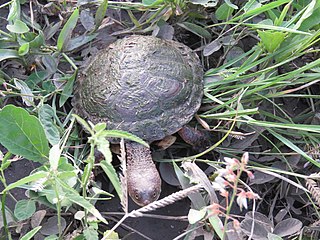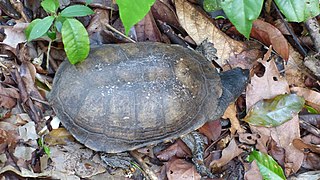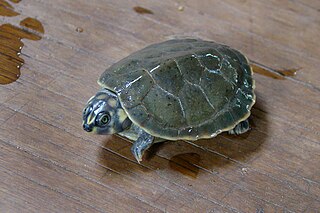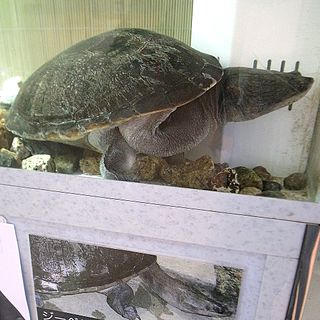Related Research Articles

Macrochelys is a genus of very large freshwater turtles in the family Chelydridae from Southeastern United States. Only a single extant species was recognized until a 2014 study divided it into two, or possibly three species.

The Chaco side-necked turtle or Chaco sideneck turtle is a species of turtle in the family Chelidae. It is found in Argentina, Paraguay, and possibly Bolivia. Its natural habitat is subtropical or tropical moist montane forests. The turtle possesses long horny spurs on its upper thighs. It is 18 cm in shell length. Like other members of its genus, the turtle buries itself in the mud when the streams run dry, a behaviour possibly parallel to the winter hibernating behaviours of turtles further north.

The Brazilian radiolated swamp turtle is a species of turtle in the Chelidae family endemic to Brazil.

The black spine-neck swamp turtle, also commonly known as the spiny-neck turtle or Spix's sideneck turtle, is a species of turtle in the family Chelidae. The species is endemic to South America, specially in the Southern Cone region.

The New Guinea snake-necked turtle is a species of turtle in the family Chelidae. The species is found almost exclusively within Western Province, Papua New Guinea.
Pritchard's snake-necked turtle is a species of turtles in the family Chelidae. The species is endemic to a restricted area of Central Province, Papua New Guinea.

The Bellinger River turtle is a species of turtle in the family Chelidae. The species is of moderate size, and is endemic to Australia with a highly restricted distribution to the small coastal drainage of the Bellinger River in New South Wales. In the past the species was considered locally abundant. The species' preferred habitat is the deeper pools of the clear-water upstream reaches of the river, where water flows continuously in most months over a bedrock basement and a stream bed of boulders, pebbles, and gravel. A captive breeding program has been under way since a 2015 virus outbreak came close to wiping out the entire species; most remaining individuals are currently housed in quarantine, though a small number have been reintroduced to the original habitat.

The Western New Guinea stream turtle or New Guinea snapping turtle is a species of freshwater turtle in the Chelidae family. It is found in the Bird's Head Peninsula and the Bomberai Peninsula west of Cenderawasih Bay, and on the island of Waigeo of West Papua, Indonesia.
Pelusios broadleyi, commonly known as the Turkana mud turtle, Broadley's mud turtle, or the Lake Turkana hinged terrapin, is a species of turtle in the family Pelomedusidae. The species is native to eastern Africa.

The red-headed Amazon side-necked turtle, red-headed river turtle or red-headed sideneck is a species of turtle in the family Podocnemididae. It is found in the Amazon basin in Brazil, Colombia, and Venezuela.

The six-tubercled Amazon River turtle or six-tubercled river turtle is a species of turtle in the family Podocnemididae.

Elseya dentata, the northern snapping turtle, is a large aquatic turtle found throughout many rivers in northern Western Australia and the Northern Territory. It is one of three species in the nominate subgenus Elseya.

Chelodina (Chelydera) burrungandjii, the sandstone snake-necked turtle or Arnhem Land long-necked turtle, is a medium-sized turtle reaching carapace lengths of 316 mm. The species is found in the sandstone plateaus and escarpments and the plunge pools of Arnhem Land of the Northern Territory. The species had been long recognised as valid. However, it had been difficult to research due to the remoteness of its habitat. Efforts to breed this species in captivity had been largely unsuccessful, until National Aquarium Herpetologist Matthew Benedict lead a successful breeding project in 2021. The species occurs in proximity to Chelodina rugosa, to which it is closely related. For the most part the two species are parapatric in distribution. However, they do come together in limited locations such as plunge pools at the base of the escarpments. In these areas there is hybridization between the species.

The Chaco tortoise, also known commonly as the Argentine tortoise, the Patagonian tortoise, or the southern wood tortoise, is a species of tortoise in the family Testudinidae. The species is endemic to South America.

Elseya schultzei, commonly known as Schultze's snapping turtle, is a species of chelid turtle endemic to northern New Guinea.

Chelodina (Chelydera) kuchlingi, commonly known as Kuchling's long-necked turtle or Kuchling's turtle, is a species of freshwater turtle in the family Chelidae. The species is endemic to Australia.
Chelodina walloyarrina, the Kimberley long neck turtle,Kimberley snake-necked turtle, is a large species of long neck turtle endemic to the Kimberley region of Western Australia. In recent years, it has been unclear as to whether this was a valid species or not. It has been recognised as such by the 2017 version of the Turtle Checklist.

The Sonoran Desert tortoise, or Morafka's desert tortoise, is a species of tortoise native to the Sonoran Desert.

Scott A. Thomson is an Australian herpetologist, paleontologist, and taxonomist, specialising in turtles of the family Chelidae.
Chelodina gunaleni or Gunalen's snake-necked turtle is a turtle species in the family Chelidae. The species is endemic to the lowlands of west-central West Papua, Indonesia, south of the central ranges.
References
- ↑ IUCN/SSCTortoise and Freshwater Turtle Specialist Group
- ↑ Van Dijk, Peter Paul; Iverson, John; Shaffer, Bradley; Bour, Roger; Rhodin, Anders; et al. (Turtle Taxonomy Working Group) (2011). "Turtles of the World, 2011 Update: Annotated Checklist of Taxonomy, Synonymy, Distribution, and Conservation Status". Conservation Biology of Freshwater Turtles and Tortoises. pp. 000.165–000.242. doi:10.3854/crm.5.000.checklist.v4.2011. ISBN 978-0965354097.
- ↑ Van Dijk, Peter Paul; Iverson, John; Shaffer, H. Bradley; Bour, Roger; Rhodin, Anders; et al. (Turtle Taxonomy Working Group) (2012). "Turtles of the World, 2012 Update: Annotated Checklist of Taxonomy, Synonymy, Distribution, and Conservation Status". Conservation Biology of Freshwater Turtles and Tortoises. doi:10.3854/crm.5.000.checklist.v5.2012. ISBN 978-0965354097.